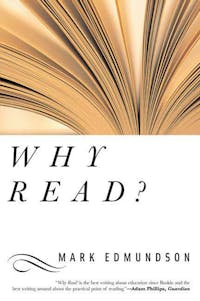Why Read?
 Download image
Download image
ISBN10: 1582346089
ISBN13: 9781582346083
Paperback
160 Pages
$16.00
CA$16.00
Nominated for the Frederic W. Ness Book Award (from the Association of American Colleges and Universities)
Mark Edmundson dramatizes what the recent identity crisis in the humanities has effectively obscured: that reading can change your life for the better. Edmundson's controversial Harper's Magazine article, "On the Uses of the Liberal Arts: As Light Entertainment for Bored College Students," has been the most photocopied essay on American college campuses over the past five years. Here he picks up where that influential piece left off. First he exposes universities' ever-growing consumerism at the expense of a life-altering liberal arts education. In today's colleges, students get what they most immediately want—country club campuses, professional training, easy grades, "fun" classes—rather than being challenged and inspired by great works of literature and art. But what can be done to change this sorry situation?
Edmundson is highly skeptical about most established forms of literary teaching and criticism, believing that they ruin students' chances of truly being influenced by the best that's been thought and said. Edmundson enjoins educators to stop offering condescending analytic technique and facile entertainment and to begin teaching students to read in a way that can change their lives for the better. He argues that questions about the uses of literature—what would it mean to live out of this book, to see it as a guide to life, to make it your secular Bible—are the central questions to ask in a literary education. Right now these questions are being ignored, even suppressed, yet the questions have never been so pressing. If religion continues to lose its hold on significant sections of contemporary society, what can take its place in shaping and guiding souls? Great writing, Edmundson argues. At once controversial and vital and inspiring, this is a groundbreaking book written with the elegance and power to change the way we teach and read.
Reviews
Praise for Why Read?
"Thoughtful . . . striking . . . Edmundson lobbies for demonstrating literature's importance by teaching it through asking big, risk-taking philosophical questions."—The Philadelphia Inquirer
"Edmundson's writing soars . . . [He] demonstrates how, by becoming an advocate for the text, a teacher can present an author's work in a way that matters here, and now, for the students' hearts, bodies and minds . . . A masterpiece."—Peter Walpole, Virginia Quarterly Review
"Why Read? is an encomium to literature and reading, a passionate argument . . . Edmundson is dead on target."—Jonathan Yardley, The Washington Post Book World
"Why Read? makes passionate arguments for literature's soul-making potential."—The News & Observer (Raleigh)
"Wonderfully clear-eyed about the pains and pleasures of learning . . . One of the more inspiring days at school in recent memory."—San Francisco Chronicle
"Edmundson argues that books are more than just vitamins for the brain. They literally can change the direction of a person's life . . . Why Read? is a focused appeal to students and teachers at the college level to use literature as a springboard into discussions about what matters deeply in life: questions of love, honor, heroism, work, and spirituality."—The Plain Dealer (Cleveland)
"Edmundson calls for a new humanist education that stresses the importance of literary reading and teaching in making a life, and in ethical decisions. Expanding on his essay 'On the Uses of the Liberal Arts' (Harper's), he discusses the interpretation of literature as a process of understanding, identification, impersonation, and spiritual truth, which leads to the reader developing a final narrative or life vision. Using this framework, Edmundson describes his own method of teaching Henry James, Shakespeare, Homer, Dickens, and Wordsworth, and also considers the critical writings of Emerson, Orwell, Frye, de Man, and Matthew Arnold, among others. He criticizes America's consumer society and university culture, seeing the proper study of literature as a way to make the society more open, fulfilling, and democratic. Engaging and controversial, this book will lead to discussion and debate."—Library Journal
"Reading literature nurtures our intelligence, our imagination, and our very soul. So believes Edmundson, a professor at the University of Virginia, as so many great thinkers have believed over the centuries, writers Edmundson quotes with passion and expertise as he places literature at the very heart of a liberal-arts education, which he fears is becoming an endangered tradition. An eloquent advocate, Edmundson continues the invaluable refresher course on the significance of the humanities that he's been so ably conducting in Harper's magazine and in his previous book, Teacher (2002). Here he objects to the commercialization of higher education as students are recast as consumers and instruction is reduced to job training. Edmundson feels that students deserve, and need, more. He avers, 'The purpose of a liberal arts education is to give people an enhanced opportunity to decide how they should live their lives,' and that literature is 'the major cultural source of vital options.' Edmundson's many-faceted argument is forthright, rigorous, and inspiring as he convincingly links literature with hope and humanism with democracy."—Booklist

